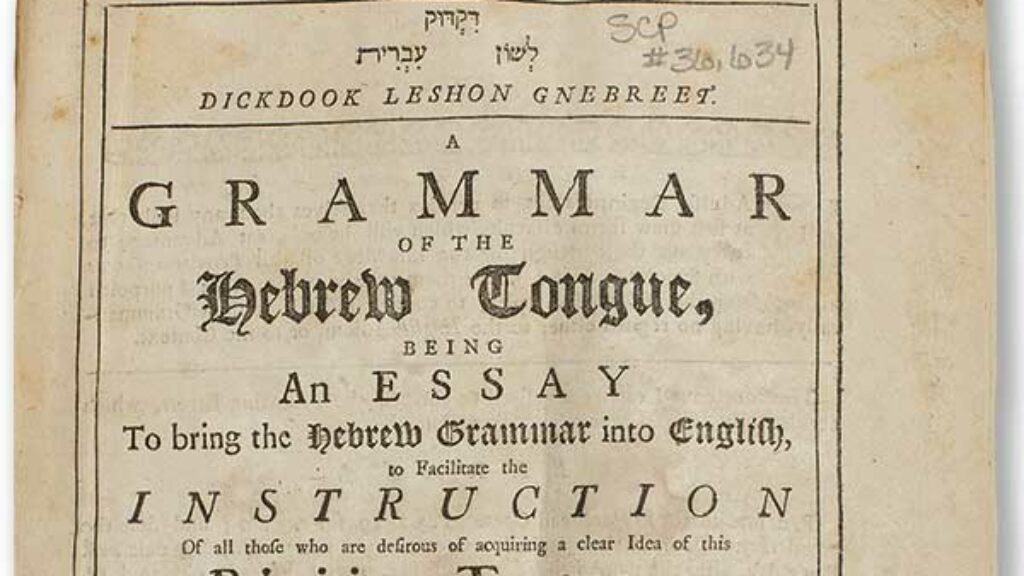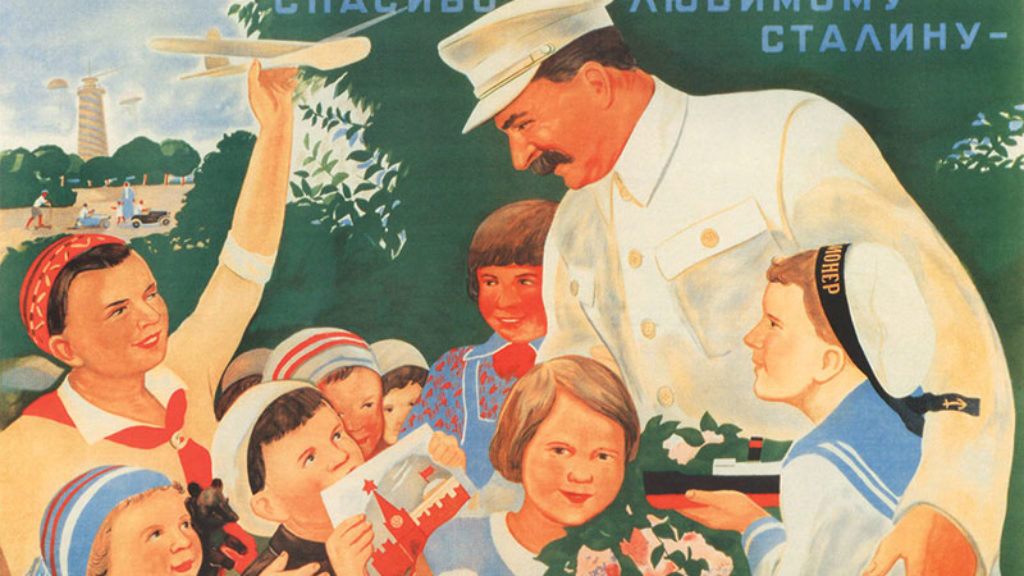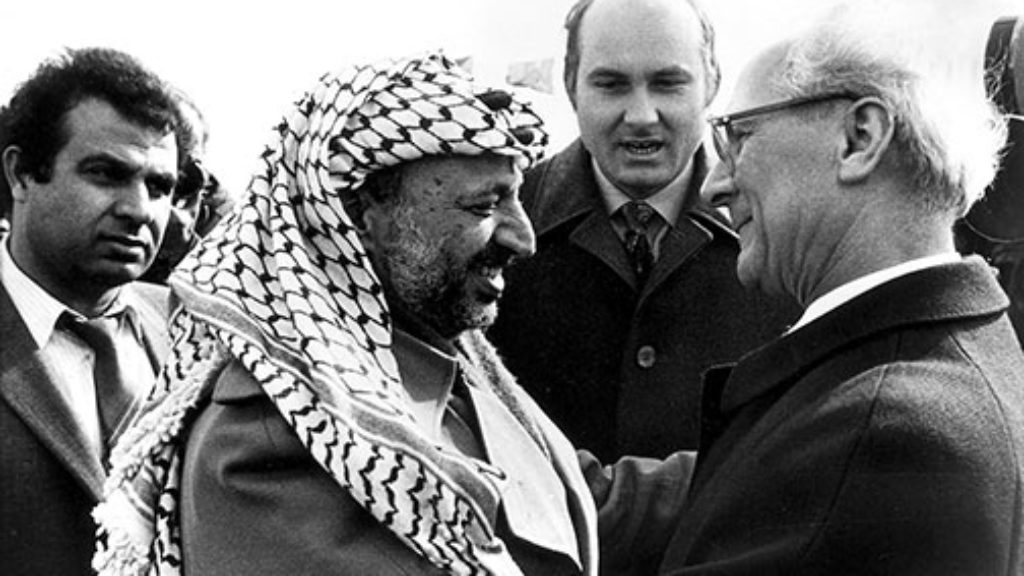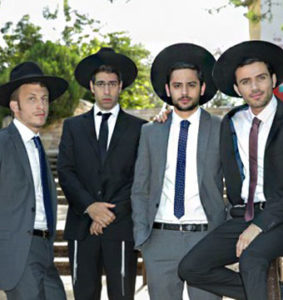Shababshubap
Shababnikim, the new Israeli dramedy created and directed by television rookie Eliran Malka and produced by veteran Daniel Paran (who produced Arab Labor, among other hits), opens with a shot of a yeshiva lined with books and benches, crowned with an ostentatious and precariously hung chandelier. To the strains of an electric guitar picked rhythmically, the rosh yeshiva enters and makes his way to the podium where he delivers a rousing lecture. As the rosh yeshiva reaches his spirited climax, the ponderous light fixture comes crashing down, killing him instantly. (The short role is exuberantly played by the late theater director and actor Micah Lewensohn who died during production of entirely natural causes.) Cut to the theme song, which imparts funky words of wisdom like “groove it on” and “shake your body to the beat” and the zany effect is complete. The yeshiva students in Shababnikim do not march to the traditional tones of klezmer, rather to the beat of a different, hipper drum.
In the wake of the rosh yeshiva’s death, the school recruits a new dean, the tall and austere rabbi Ashi Spitzer (Rotem Keinan), whose brilliance is outmatched only by his cruelty. Shababnikim follows the travails of three inseparable roommates—Dov Laser (Omer Perlman Striks), Avinoam Lasri (Daniel Gad), and Meir Sabag (Israel Atias)—as they strain under Spitzer’s increasingly Spartan regime. Then there is Gedaliah (Ori Laizerouvich), a nerdy scholar whose awkwardness forestalls every date, thrust into their dorm room by a well-meaning rabbi (Dov Navon) who hopes that Gedaliah might learn how to be cool in school.
Shababnikim gets its name from the modern Hebrew slang term for yeshiva boys on the margins. The word’s etymology—from the Arabic shabab (“youth”) capped by the Yiddish suffix –nik—hints at the charged hybridity of Mizrahi yeshiva students in Ashkenazi institutions, and the show mines this tension for dramatic effect. For example, despite his best efforts to adopt the dress and diction of Ashkenazi haredi culture, Meir is demeaned by yeshiva officials and matchmakers for his North African roots. When his hardscrabble Mizrahi neighborhood welcomes him home as a rock star—drinking in his Torah lessons and eagerly accepting his fertility blessings—Meir is awakened to his own Sephardi sexiness. As one neighbor observes, he looks like a cross between Marlon Brando and the equally stylish former chief rabbi Ovadia Yosef.
To its credit, Shababnikim explores the fault lines between secular and haredi with a successful combination of seriousness and silliness. Avinoam wants nothing more than to be part of broader, secular Israeli society. He buys his dark suits at Zara and takes pride in winning a football match—without realizing that though they may shop at Zara, secular Israelis dress casually and know nothing about American football. When a soldier insults haredi draft dodging during a rescue operation, Dov is willing to pay the ultimate price to protect his community’s dignity by running through a (literal) minefield. For his part, Gedaliah is engaged in a pitched battle against his sexual desire, tormented by any and every female he encounters, be it a titillating billboard or the middle-aged wife of a donor.
Haredim have become a common sight on Israeli screens, including two seasons of the pitch-perfect Shtisel, about an extended ultra-Orthodox family, and the documentary Zman Ponevezh (“Ponevezh Time”) which provided unprecedented access to the famed talmudic academy in Bnei Brak. Just when we thought we knew something about the two-toned palette of haredi society, Shababnikim presents us with yet another unexplored universe, really a subculture of a subculture, where the strict dress code remains black and white, but is now tinted with neon accents. To convey the hidden joys of yeshiva life, the camera work is bright: Students are seen pillow-fighting or carrying inflatable rafts as if on their way to a river adventure. Even more striking than the visuals is the funky soundtrack, which alternates between Israeli pop, Middle Eastern rock, folk music, blues, funk, and rap.
Both Shtisel and Zman Ponevezh were praised for their uncompromising, ethnographic attention to detail. According to series creator Eliran Malka, who is himself Mizrahi and a product of an (admittedly liberal) yeshiva, Shababnikim did its homework and even employed yeshiva students as regular consultants. With its incongruent pairings between pious visuals and raucous sound, Shababnikim clearly takes a different tack, though one that rings no less true. Contrary to popular conception, top haredi institutions, like the Jerusalem-based Hebron yeshiva (“the Harvard of yeshivas,” as the show puts it), house stylish, relatively worldly yeshiva students who, alongside a steady diet of Lithuanian lamdus, enjoy short espressos, long secular novels, and Van Damme action movies. Perhaps most shocking to viewers are the scenes of our shababnikim casually learning late at night in their underwear, to the strains of Israeli soft rock and the sweet drag of a cigarette. Rather than a late capitalist invention, their remarkable comfort in their own skins and willingness to flirt with hedonism and heresy is a legacy of Eastern European yeshiva life—especially the Slobodka school—where some students imagined themselves philosopher princes who should dress smartly and not fret about excessive pieties.
With all the fun and games, the stakes in Shababnikim are high and existential. Who will remain in the yeshiva under the new leadership and who will be driven out? Who commands respect and who loses their shirt in a pick-up game? Who finds love and who languishes in repressed frustration? As always, only God, Living and Enduring, knows.
Shababnikim currently airs on the HOT network in Israel. The first two episodes are available on Youtube.
Suggested Reading

Inventing American Judaism
Unlike the Jews of Venice, whose charter was anxiously renegotiated every decade or so, American Jews participated in civic life, confidently building themselves a future.
Rashi and the Crusader: A Legend
Did the great biblical and talmudic commentator meet Godfrey of Bouilon? A fascinating excerpt from Gedaliah ibn Yahya's Shalshelet ha-Kabbalah.

Patriotism and Its Discontents
While many Jews embraced the Russian revolutionary cause from the very beginning—four of the seven members of the first Bolshevik Politburo were Jews—the revolution did not embrace them for long.

East Meets West
Following the Six-Day War, the East German government and the West German far left demonized Israel time and again, often vilely equating it with the worst thing in their own nation’s history: Nazism.

Comments
You must log in to comment Log In